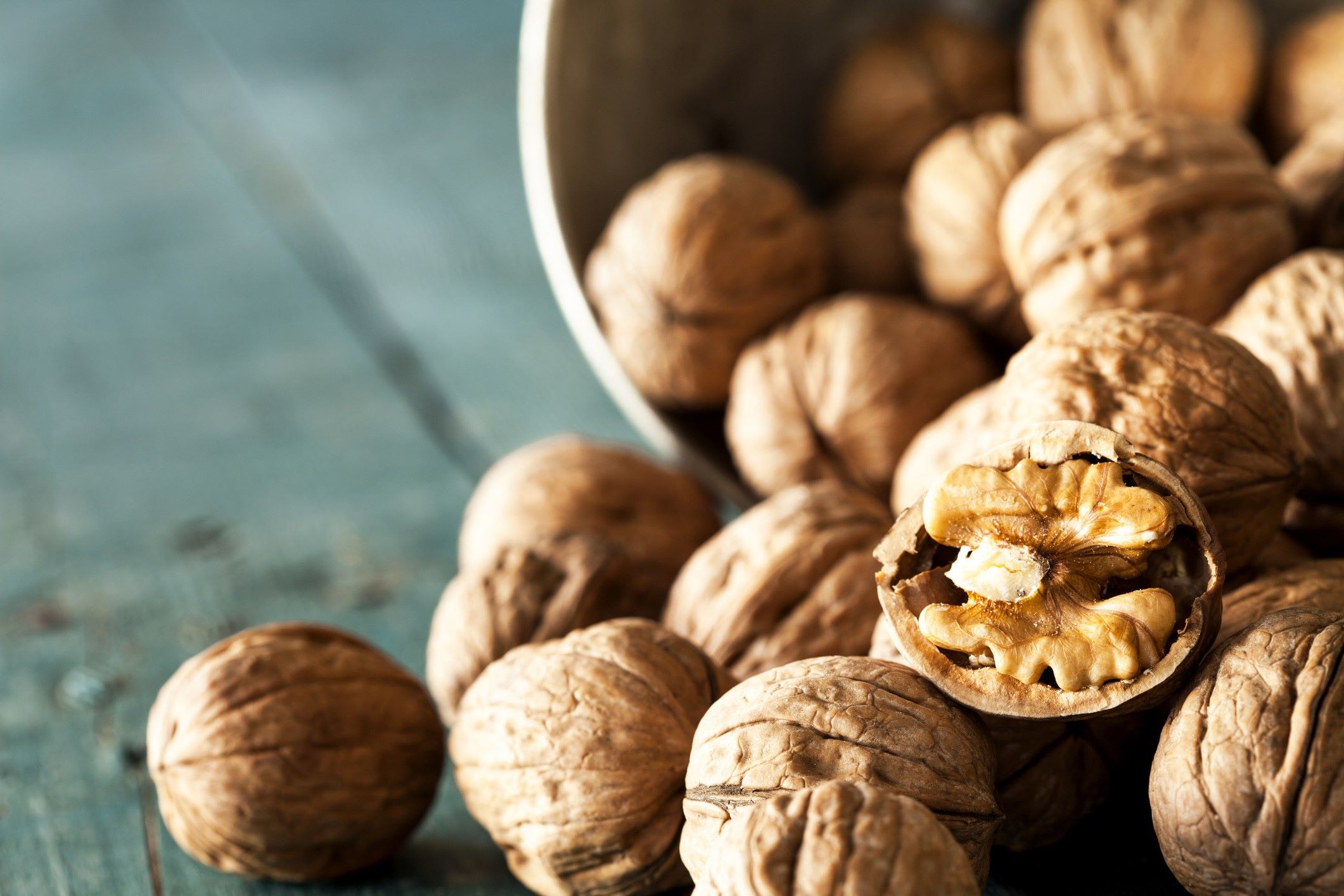Home>Health & Nutrition>Why Runners Should Incorporate More Walnuts Into Their Diet For Optimal Health Benefits


Health & Nutrition
Why Runners Should Incorporate More Walnuts Into Their Diet For Optimal Health Benefits
Published: February 24, 2024
Discover the health and nutrition benefits of incorporating walnuts into a runner's diet for optimal performance and overall well-being.
(Many of the links in this article redirect to a specific reviewed product. Your purchase of these products through affiliate links helps to generate commission for Therunningadvisor.com, at no extra cost. Learn more)
Table of Contents
- The Nutritional Benefits of Walnuts for Runners
- How Walnuts Can Improve Running Performance
- The Role of Walnuts in Supporting Heart Health for Runners
- Incorporating Walnuts for Brain Health and Cognitive Function
- The Anti-Inflammatory Properties of Walnuts for Runners
- Tips for Adding More Walnuts into a Runner's Diet
The Nutritional Benefits of Walnuts for Runners
Walnuts are a powerhouse of essential nutrients that can significantly benefit runners and enhance their overall health. Packed with omega-3 fatty acids, antioxidants, vitamins, and minerals, walnuts offer a wide array of nutritional advantages that can support runners in achieving their fitness goals.
Omega-3 Fatty Acids
Walnuts are one of the richest plant-based sources of omega-3 fatty acids, particularly alpha-linolenic acid (ALA). These essential fatty acids play a crucial role in reducing inflammation, supporting cardiovascular health, and promoting optimal brain function. For runners, the anti-inflammatory properties of omega-3s can aid in faster recovery from intense workouts and reduce the risk of exercise-induced injuries.
Antioxidants
The presence of antioxidants, such as polyphenols and vitamin E, in walnuts provides protection against oxidative stress and helps combat the harmful effects of free radicals generated during strenuous physical activity. By incorporating walnuts into their diet, runners can fortify their immune system and minimize the impact of oxidative damage on their muscles and tissues.
Protein and Fiber
Walnuts are a good source of plant-based protein and dietary fiber, both of which are essential for runners. Protein supports muscle repair and growth, while fiber aids in digestion and promotes satiety, helping runners maintain energy levels and manage their weight effectively.
Vitamins and Minerals
Walnuts contain an array of vitamins and minerals, including vitamin E, B vitamins, magnesium, and potassium. These nutrients are vital for maintaining overall health, supporting energy metabolism, and regulating muscle function, all of which are crucial for runners striving to perform at their best.
Incorporating walnuts into a runner's diet can provide a well-rounded nutritional boost, offering a combination of essential nutrients that contribute to improved performance, enhanced recovery, and overall well-being.
How Walnuts Can Improve Running Performance
Walnuts, with their exceptional nutritional profile, can play a pivotal role in enhancing running performance. The unique combination of nutrients found in walnuts offers several benefits that directly contribute to improved endurance, recovery, and overall athletic achievement for runners.
Enhanced Energy Levels
The energy demands of running are substantial, requiring a constant supply of fuel to sustain performance. Walnuts provide a rich source of healthy fats, including omega-3 fatty acids and monounsaturated fats, which serve as a valuable energy source for endurance activities. These fats are efficiently utilized by the body to fuel prolonged physical exertion, thereby supporting sustained energy levels during runs.
Muscle Recovery and Repair
The physical strain of running can lead to muscle fatigue and micro-tears, necessitating efficient recovery for continued progress. The protein content in walnuts, combined with their anti-inflammatory properties, supports muscle repair and recovery. This aids in minimizing post-run soreness and expediting the healing process, enabling runners to bounce back more quickly for their next training session or race.
Oxygen Utilization and Endurance
The omega-3 fatty acids present in walnuts contribute to improved oxygen utilization, a critical factor in endurance sports such as running. By enhancing the efficiency of oxygen delivery to working muscles, walnuts can help delay the onset of fatigue and improve overall endurance capacity. This can be particularly advantageous during long-distance runs or high-intensity training sessions.
Cognitive Function and Focus
Running requires not only physical stamina but also mental acuity and focus. The presence of antioxidants and neuroprotective compounds in walnuts supports brain health and cognitive function. By incorporating walnuts into their diet, runners can potentially experience improved mental clarity, concentration, and decision-making during training and competition.
Weight Management and Nutrient Density
Maintaining an optimal body weight is crucial for running performance, and walnuts can contribute to effective weight management. The combination of protein, fiber, and healthy fats in walnuts promotes satiety, helping runners feel fuller for longer periods and potentially reducing overall calorie intake. Furthermore, the nutrient density of walnuts ensures that runners receive essential vitamins, minerals, and antioxidants without excessive caloric intake, supporting overall health and performance.
Incorporating walnuts into a runner's diet can yield tangible benefits in terms of improved energy levels, enhanced recovery, and optimized endurance, ultimately contributing to elevated running performance and overall athletic success.
The Role of Walnuts in Supporting Heart Health for Runners
Walnuts play a crucial role in supporting heart health, making them an invaluable addition to a runner's diet. The unique composition of nutrients found in walnuts offers multifaceted benefits that directly contribute to cardiovascular well-being, a particularly vital aspect for individuals engaged in regular running and endurance activities.
Omega-3 Fatty Acids and Cardiovascular Health
One of the standout features of walnuts is their high content of omega-3 fatty acids, specifically alpha-linolenic acid (ALA). These essential fatty acids have been extensively studied for their positive impact on heart health. ALA, in particular, has been associated with a reduced risk of cardiovascular disease, as it helps lower levels of "bad" LDL cholesterol and triglycerides while promoting the increase of "good" HDL cholesterol. For runners, this can translate to improved cardiovascular function, better blood flow, and reduced risk of heart-related complications, ultimately supporting their endurance and overall well-being.
Antioxidants and Anti-Inflammatory Properties
In addition to omega-3 fatty acids, walnuts are rich in antioxidants, including polyphenols and vitamin E. These antioxidants play a pivotal role in protecting the cardiovascular system from oxidative stress and inflammation. Oxidative stress can lead to the development of atherosclerosis, a condition characterized by the buildup of plaque in the arteries, potentially impeding blood flow and increasing the risk of heart disease. By incorporating walnuts into their diet, runners can benefit from the protective effects of antioxidants, which help mitigate oxidative damage and maintain the health and elasticity of blood vessels, essential for optimal cardiovascular function.
Blood Pressure Regulation and Vascular Health
High blood pressure, or hypertension, is a common concern among individuals engaged in regular physical activity, including running. The potassium content in walnuts contributes to blood pressure regulation, supporting cardiovascular health. Potassium helps counteract the adverse effects of sodium, promoting vasodilation and reducing the strain on the heart. By maintaining healthy blood pressure levels, runners can minimize the risk of hypertension-related complications and enhance their cardiovascular resilience, ultimately supporting their running performance and overall health.
Cholesterol Management and Arterial Health
The combination of omega-3 fatty acids, antioxidants, and fiber in walnuts contributes to effective cholesterol management and arterial health. The synergistic effects of these nutrients help reduce the accumulation of plaque in the arteries, improve lipid profiles, and support overall cardiovascular function. For runners, this translates to enhanced blood flow, improved oxygen delivery to working muscles, and reduced risk of cardiovascular complications during intense physical exertion.
Incorporating walnuts into a runner's diet can significantly contribute to the maintenance of heart health, providing a comprehensive array of nutrients and protective compounds that support cardiovascular function, blood flow, and overall cardiovascular resilience.
Incorporating Walnuts for Brain Health and Cognitive Function
Walnuts are not only beneficial for physical health but also play a vital role in supporting brain health and cognitive function. The unique composition of nutrients found in walnuts offers multifaceted benefits that directly contribute to optimal brain function, making them a valuable addition to a runner's diet.
Omega-3 Fatty Acids and Brain Function
The high concentration of omega-3 fatty acids, particularly alpha-linolenic acid (ALA), in walnuts is instrumental in promoting brain health and cognitive function. These essential fatty acids are integral components of the brain cell membranes and play a crucial role in supporting neurotransmission and synaptic plasticity. By incorporating walnuts into their diet, runners can potentially experience improved cognitive function, enhanced memory retention, and overall brain health.
Antioxidants and Neuroprotective Compounds
Walnuts are rich in antioxidants, including polyphenols and vitamin E, which offer neuroprotective benefits. These antioxidants help combat oxidative stress and reduce the impact of age-related cognitive decline. Additionally, the presence of neuroprotective compounds in walnuts supports the maintenance of neural pathways and cognitive acuity, potentially enhancing mental clarity and cognitive performance for runners.
Brain-Derived Neurotrophic Factor (BDNF) Stimulation
Research has shown that walnuts may contribute to the stimulation of brain-derived neurotrophic factor (BDNF), a protein that supports the growth, survival, and function of neurons in the brain. Increased levels of BDNF are associated with improved cognitive function, enhanced learning capacity, and a reduced risk of neurodegenerative conditions. By incorporating walnuts into their diet, runners can potentially benefit from the positive impact of BDNF on brain health and cognitive function.
Cognitive Resilience and Mental Acuity
The combination of nutrients in walnuts, including omega-3 fatty acids, antioxidants, and neuroprotective compounds, supports cognitive resilience and mental acuity. Runners may experience improved focus, concentration, and cognitive flexibility, which are essential for maintaining peak performance during training and competition. Furthermore, the neuroprotective properties of walnuts may contribute to a reduced risk of cognitive decline and age-related cognitive impairments, supporting long-term brain health for runners.
Incorporating walnuts into a runner's diet can yield significant benefits for brain health and cognitive function, offering a natural and nutritious way to support optimal brain performance and overall cognitive well-being.
Read more: Why Runners Should Consider Trying Hot Yoga
The Anti-Inflammatory Properties of Walnuts for Runners
Walnuts are renowned for their potent anti-inflammatory properties, making them a valuable dietary addition for runners seeking to optimize their performance and recovery. In the context of running, inflammation is a natural response to the physical stress placed on the body during training and competition. While acute inflammation is a crucial part of the body's healing process, chronic inflammation can impede recovery, increase the risk of injury, and hinder overall athletic progress. This is where the anti-inflammatory benefits of walnuts come into play, offering a natural and effective way to mitigate excessive inflammation and support the body's resilience.
The omega-3 fatty acids found in walnuts, particularly alpha-linolenic acid (ALA), are key contributors to their anti-inflammatory properties. ALA serves as a precursor to anti-inflammatory compounds, such as eicosapentaenoic acid (EPA) and docosahexaenoic acid (DHA), which play pivotal roles in modulating the body's inflammatory response. By incorporating walnuts into their diet, runners can potentially experience a reduction in systemic inflammation, leading to faster recovery, reduced muscle soreness, and a lower risk of overuse injuries.
In addition to omega-3 fatty acids, walnuts contain polyphenols and other phytonutrients with anti-inflammatory effects. These bioactive compounds help combat oxidative stress and modulate inflammatory pathways, contributing to a balanced inflammatory response in the body. For runners, this means a potential reduction in exercise-induced inflammation, allowing for more efficient recovery between training sessions and a decreased likelihood of experiencing chronic inflammation-related issues.
Furthermore, the combination of antioxidants and anti-inflammatory nutrients in walnuts supports overall immune function, which is crucial for runners undergoing rigorous training regimens. By mitigating excessive inflammation, walnuts can help maintain immune resilience, reducing the likelihood of illness or infection that may result from prolonged, intense physical exertion.
Incorporating walnuts into a runner's diet provides a natural and flavorful means to harness the anti-inflammatory benefits of these nutrient-dense nuts. Whether consumed as a convenient snack, added to salads, or incorporated into post-run meals, walnuts offer a versatile and delicious way for runners to support their body's inflammatory balance and optimize their overall athletic performance.
Tips for Adding More Walnuts into a Runner's Diet
Incorporating walnuts into a runner's diet can be a simple and enjoyable process, offering a myriad of culinary possibilities while reaping the nutritional benefits of these versatile nuts. Here are some practical tips for seamlessly integrating walnuts into a runner's dietary regimen:
-
Snack Smart: Keep a stash of walnuts in resealable bags or small containers for convenient snacking on the go. A handful of walnuts provides a satisfying crunch and a nutrient-packed energy boost, making it an ideal snack option before or after a run.
-
Breakfast Boost: Sprinkle chopped walnuts over oatmeal, yogurt, or cereal to add a delightful crunch and a dose of healthy fats and protein to your morning meal. This simple addition can enhance the nutritional profile of your breakfast and provide sustained energy for your runs.
-
Salad Sensation: Toss walnuts into salads to elevate both the flavor and nutritional content. The combination of textures and flavors, along with the added nutritional benefits, makes walnuts a delightful and healthful addition to any salad.
-
Baking Brilliance: Incorporate walnuts into homemade granola bars, muffins, or energy balls for a nutritious and delicious treat. The natural richness of walnuts adds depth to baked goods while contributing essential nutrients, making them a wholesome choice for pre- or post-run snacks.
-
Savory Sizzle: Use crushed or finely chopped walnuts as a coating for baked chicken or fish to add a delightful crunch and a boost of healthy fats and protein to your main dishes. This creative approach infuses your meals with added nutrition and a satisfying texture.
-
Trail Mix Triumph: Create a custom trail mix by combining walnuts with dried fruits, seeds, and a hint of dark chocolate for a balanced and energizing snack. This portable mix provides a blend of carbohydrates, protein, and healthy fats, making it an ideal fuel option for long runs or hikes.
-
Nut Butter Nirvana: Experiment with homemade walnut butter as a nutritious spread for toast, fruit, or as a flavorful addition to smoothies. The creamy texture and rich flavor of walnut butter offer a delectable way to incorporate the nutritional benefits of walnuts into your diet.
By incorporating these creative and practical tips, runners can seamlessly integrate walnuts into their daily meals and snacks, harnessing the nutritional prowess of these versatile nuts to support their training, performance, and overall well-being.



